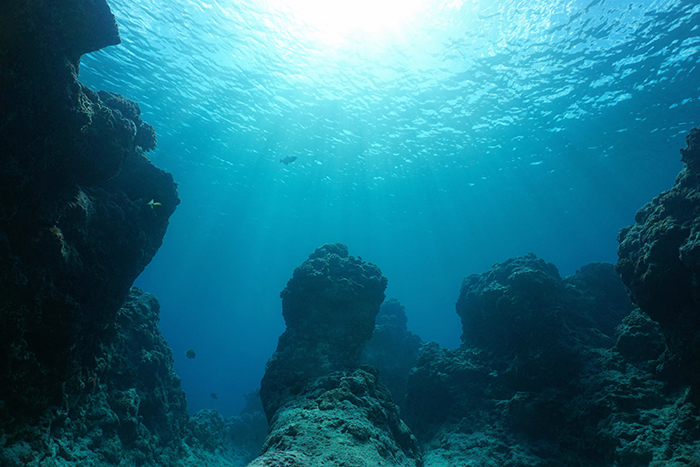Interviews / Ocean
16 November 2022
Protection of the Seabed: Between Environmental Realism and Geopolitical Interests

At the outset of COP 27, which was particularly focused on the establishment of financial mechanisms to combat climate change, President Macron’s announcement to “support the ban on any exploitation [1] of the deep seabeds” comes as a pleasant surprise [2]. Although brief, it helps bring a maritime focus to a conference whose interest in the ocean, and by extension the deep seabeds, is growing but still limited. Initiatives such as the international campaign Because the Ocean or the Ocean and Climate Platform have, however, led to concrete progress, such as the organization of a Blue COP in 2019 and the recent launch of the One Ocean Summits. This frank and bold statement from the President regarding the deep seabeds shows that France is considering the ocean in the fight against climate change. Nevertheless, the extraction of metals and rare earths found in the seabeds could address the growing energy needs and the demands of the ecological transition. In such a context, France’s positioning raises questions. Here’s a closer look with Gabrielle Larricq, a research assistant working on maritime geopolitics at IRIS.
What are the reasons that led the French president to make this proposal? Does it stem from listening to demands, or is it an instrument of environmental diplomacy?
The element of surprise should be measured given the repetitive nature of the announcement [3]. However, the strategic ambiguity maintained by France and the ambivalence of the proposals made at various levels of government make the statement a welcome clarification. In fact, the France 2030 strategy, presented a year ago, still promises to invest massively in the deep seabed, although the Secretary of State for the Sea recently stated that this investment would be directed towards scientific research. The proposed ban on exploitation also challenges the National Strategy for the Exploration and Exploitation of Mineral Resources in the Deep Seabed, presented at the 2021 Interministerial Committee on the Sea (CIMer), which was meant to help France understand the stakes and feasibility of seabed exploitation. The Levet report, which led to this strategy, saw exploitation as an economic lever and a response to the need for metals, thus justifying the need to “valorize all or part of an exploration/exploitation sector that is economically and geostrategically relevant” (2021, p.16). These documents continuously link exploration and exploitation, and it seems today that a considerable part of these projects will have to be reconsidered. At the same time, the Ministry of Armed Forces published its Ministerial Strategy for Mastering the Deep Seabed (2022) to respond to emerging threats in this newly contested space. While the interministerial strategy focuses on mineral resources from the seabed and subsoil, that of the Armed Forces also takes into account the water column to more broadly control the deep seabed area. All these examples demonstrate a French intention to invest and act on and in the deep seabed with a presence that is scientific, industrial, and military. Therefore, the proposed ban on exploitation would disrupt the lines of these two political strategies. What would be the logic behind this?
President Macron’s announcement would allow France, on one hand, to strengthen its role as a key figure in the fight for environmental protection and multilateralism. The announcement on the deep seabed follows that of the One Forest Summit, which France will organize with Gabon, and is directly aligned with the perspective of the United Nations Conference in 2025, co-organized with Costa Rica [4]. On the other hand, this environmental diplomacy would allow France to anticipate possible legislation at the European level. For now, the EU is only remotely interested in the deep seabed. France thus benefits from clearly positioning itself and developing expertise on this issue.
Finally, in the broader context of France’s strategy in the Indo-Pacific, this statement brings France closer to the Pacific Island nations in a path distinctly different from that proposed by the United States or China. This point of convergence would be part of an even more interesting dynamic: by going further than the island states that advocated for a moratorium, i.e., a precautionary pause limited in time, France positions itself as the figure to follow by proposing a permanent ban on exploitation.
What implementation of the ban proposal could be envisaged with the International Seabed Authority?
The fact that President Macron goes beyond the framework of the moratorium raises several questions and limitations. Although the French Ambassador to Jamaica and the International Seabed Authority (ISA) stated that environmental concerns were a guiding principle for Western European countries[5], France had until now appeared reserved, even opposed to the moratorium[6]. At the end of the third annual ISA meeting on Friday, November 11, France, which spoke first, confirmed President Macron’s statement, though it emphasized the importance of scientific exploration. While this was welcomed by some states in favor of the moratorium, who continue to support the negotiation process, the speech did not receive unanimous support. Norway, India, Russia, and Argentina criticized what they considered an extreme position that would jeopardize any consensus on the mining code and instead advocated for constructive discussions to ensure responsible and sustainable seabed exploitation. More critically, Singapore, the Cook Islands, and Nauru rejected the ban, even questioning France’s presence and its exploration contracts within the organization[7].
Negotiations will not resume until March 2023. By then, it can be assumed that such an extreme position could ultimately lead to a moratorium, becoming the middle ground. France would then have the advantage of sending a strong message without compromising its long-term mining ambitions. Furthermore, it would give France time to implement its action plan and innovate its underwater capabilities before potential exploitation. But wouldn’t joining the moratorium have made more sense? The final question remains how other countries will react and what collaborations could be put in place[8].
The Seabed: New Frontiers of Cooperation and Sovereignty
If the president is clear on the issue of mining exploitation, at least for international waters, it is also important to highlight what remains unsaid. France is not proposing to sanctuarize the seabed and, in fact, is not yet turning its back on this space. On the contrary, it aims to make the ocean a new frontier for cooperation, much like space was. The comparison is thought-provoking: if space resources are untapped, can we still consider this environment as preserved? Beyond environmental concerns, this approach reveals the interconnection of the seabed issue within a context of global scientific, industrial, and military competition. Cooperation and competition in the seabed are two sides of the same coin: France’s strategy is still recent and aims to further structure the projects of national actors. Partnering with other states while limiting their access to this space would allow France to address certain weaknesses, particularly technological ones, while also showcasing its recognized expertise. Multilateralism would therefore become a response to this competition.
Just as the exploitation of the sea is not limited to fishing, we must consider other ways of investing, mastering, and exploiting the deep seabed, thus emphasizing its profoundly geopolitical nature. In this regard, the laying of submarine cables or the use of the seabed as a maritime passageway for drones, submarines, and other vehicles are issues that will remain even with the prohibition on exploiting mineral resources in the Zone. Maintaining seabed exploration would preserve the implementation of other French strategic objectives. For example, the freedom of action of its armed forces is based on knowledge of the environment in which they operate. Emphasizing scientific exploration, with a focus on transparency and data sharing for the common good of humanity, would allow France to underscore that any obstacle to French positioning could be considered a threat to the common good and freedom of navigation.
What are the next steps for the governance of the seabed? To what extent does this position strengthen France’s role on the environmental and maritime affairs stage? What efforts will be made to effectively protect the seabed? While it is commendable to propose measures that contribute to environmental protection, we must not forget the geopolitical strategies inherent in any natural resource management policy.
_________________
[1] Exploitation, which aims at the extraction of mineral resources from the seabed and subsoil, is currently prohibited in international waters. Only exploration is currently allowed, but negotiations are ongoing at the International Seabed Authority (ISA) to establish a mining code. The ISA has approved 30 exploration contracts, all sponsored by a member state.
[2] Scientists, researchers, and activists have raised numerous concerns about the potential exploitation of the seabed. In France, a resolution proposal has been submitted to the National Assembly, while at the international level, national and international organizations are being invited to join a moratorium against exploitation.
[3] The President stated he was “faithful to what [he had] already said” during the UN Ocean Conference in Lisbon, where he had called for “a legal framework to put a stop to the exploitation of the deep seabed in international waters” (Macron, 2022).
[4] France had also initiated the One Ocean Summit held in Brest in 2022, which brought together more than 40 states.
[5] Guyonvarch, O. (2022). When the future of the dark abysses is drawn under the Caribbean sun. Marine Studies, 22, 56‑67.
[6] As recently as 01/11/2022 at the ISA, France had proposed implementing environmental compensation mechanisms, only to later support on 04/11/22 a “precautionary pause.” Save the High Seas. (2022). International Seabed Authority (ISA) Deep-Sea Mining Negotiations Tracker. https://www.savethehighseas.org/isa-tracker/category/country-positions/
[7] International Seabed Authority. (2022). Agenda Statement Docs. ISA. https://isa.org.jm/node/20798/session/statements#block-media-2
[8] Guyonvarch O. (2022). op.cit. p.61.
The Sustainable Ocean Alliance indicates that 11 states support the moratorium: Germany, Chile, Costa Rica, Spain, Ecuador, Fiji, Micronesia, New Zealand, Palau, Panama, and Samoa.

